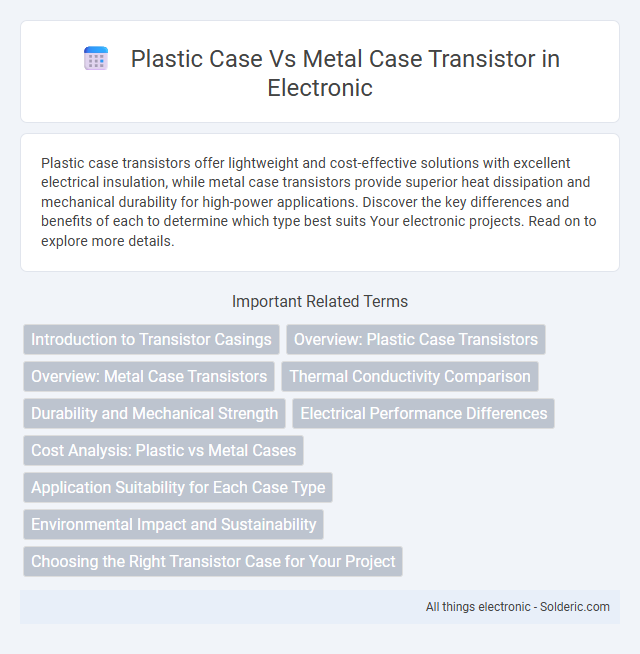Plastic case transistors offer lightweight and cost-effective solutions with excellent electrical insulation, while metal case transistors provide superior heat dissipation and mechanical durability for high-power applications. Discover the key differences and benefits of each to determine which type best suits Your electronic projects. Read on to explore more details.
Comparison Table
| Feature | Plastic Case Transistor | Metal Case Transistor |
|---|---|---|
| Material | Plastic (epoxy resin) | Metal (aluminum or steel) |
| Thermal Conductivity | Low | High |
| Heat Dissipation | Poor | Excellent |
| Durability | Moderate | High |
| Size & Weight | Lightweight, compact | Heavier, bulkier |
| Cost | Low | Higher |
| Electrical Isolation | Good (due to plastic insulation) | Requires additional insulation |
| Applications | General purpose low-power circuits | High-power, high-frequency, and industrial use |
Introduction to Transistor Casings
Transistor casings play a vital role in protecting the semiconductor material while influencing thermal conductivity and durability. Plastic cases, often made from epoxy resin, provide lightweight insulation and cost-effective manufacturing but offer lower heat dissipation compared to metal cases. Metal casings, typically aluminum or copper-based, enhance heat transfer and mechanical strength, making them ideal for high-power applications where your transistor needs efficient cooling and robust protection.
Overview: Plastic Case Transistors
Plastic case transistors offer lightweight, cost-effective protection for semiconductor materials, enhancing portability and ease of installation in various electronic applications. Their encapsulation in plastic provides adequate insulation and resistance to environmental factors, although they typically have lower thermal conductivity compared to metal case transistors. You can optimize circuit designs by selecting plastic case transistors when moderate heat dissipation and mechanical durability meet your requirements.
Overview: Metal Case Transistors
Metal case transistors offer superior thermal conductivity and durability compared to plastic case transistors, making them ideal for high-power and high-temperature applications. Their metal enclosures provide enhanced electromagnetic shielding and mechanical protection, which prolongs device lifespan and maintains stable performance. Choosing a metal case transistor can significantly improve your circuit's reliability under demanding operational conditions.
Thermal Conductivity Comparison
Metal case transistors exhibit significantly higher thermal conductivity than plastic case transistors, enabling more efficient heat dissipation and improved reliability under high power conditions. The thermal conductivity of metal cases, typically aluminum or copper alloys, ranges from 150 to 400 W/m*K, whereas plastic cases usually conduct heat at approximately 0.2 W/m*K. This stark difference makes metal cases preferable for applications requiring superior thermal management and extended device lifespan.
Durability and Mechanical Strength
Metal case transistors exhibit superior durability and mechanical strength compared to plastic cases due to their robust construction and resistance to physical impacts. Metal casings provide enhanced protection against environmental factors such as temperature fluctuations and moisture, extending the transistor's lifespan in demanding applications. Plastic case transistors, while lightweight and cost-effective, generally offer lower mechanical resilience and are more vulnerable to cracking or deformation under stress.
Electrical Performance Differences
Metal case transistors typically exhibit better thermal conductivity, allowing for improved heat dissipation and higher power handling capabilities compared to plastic case transistors. Plastic case transistors often have higher thermal resistance, which may limit their maximum operating current and voltage due to increased junction temperature. Electrical noise performance and frequency response can also differ, with metal case transistors generally offering enhanced reliability in high-frequency or high-power applications.
Cost Analysis: Plastic vs Metal Cases
Plastic transistor cases generally offer lower manufacturing costs due to cheaper raw materials and simpler production processes, making them ideal for mass-market and cost-sensitive applications. Metal cases, while more expensive, provide superior thermal conductivity and durability, which can reduce long-term costs in high-performance or harsh environmental conditions. Cost analysis reveals that choosing between plastic and metal cases depends on balancing upfront expenses against performance and reliability requirements.
Application Suitability for Each Case Type
Plastic case transistors are ideal for low-power applications and consumer electronics due to their cost-effectiveness, lightweight nature, and good electrical insulation properties. Metal case transistors excel in high-power, high-frequency, and industrial environments, offering superior heat dissipation and mechanical durability, essential for demanding circuits like audio amplifiers and RF transmitters. Selecting between plastic and metal cases depends on application requirements for thermal management, mechanical robustness, and electrical performance.
Environmental Impact and Sustainability
Plastic case transistors generally have a lower environmental impact during production due to their lightweight and less energy-intensive manufacturing processes compared to metal case transistors. However, plastic cases pose significant sustainability challenges as they are less biodegradable and contribute to long-term plastic pollution. Choosing metal case transistors can enhance Your device's recyclability and durability, promoting better sustainability through easier material recovery and extended component lifespan.
Choosing the Right Transistor Case for Your Project
Choosing the right transistor case is crucial for optimizing thermal management and durability in your electronic project. Plastic cases provide lightweight, cost-effective insulation but may struggle with heat dissipation, whereas metal cases excel in conducting heat away from the transistor, enhancing reliability under high power conditions. Evaluate your project's thermal requirements and environmental factors to determine whether a plastic or metal transistor case best protects your components while maintaining performance.
Plastic case vs Metal case transistor Infographic

 solderic.com
solderic.com